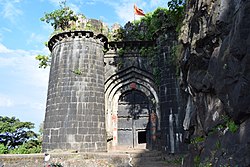| This article relies largely or entirely on a single source. Relevant discussion may be found on the talk page. Please help improve this article by introducing citations to additional sources. Find sources: "Ajinkyatara" – news · newspapers · books · scholar · JSTOR (December 2012) |
| Ajinkyatara Fort | |
|---|---|
| Part of former Maratha Empire, now Maharashtra | |
| Satara District, Maharashtra(near Satara) | |
 Entrance to Ajinkyatara fort Entrance to Ajinkyatara fort | |
 | |
| Coordinates | 17°40′20.5″N 73°59′43.4″E / 17.672361°N 73.995389°E / 17.672361; 73.995389 |
| Type | Hill fort |
| Height | 1,356 metres (4,400 ft) ASL |
| Site information | |
| Owner |
|
| Open to the public | Yes |
| Site history | |
| Materials | Stone, lead |
| Garrison information | |
| Past commanders | Chhatrapati Shivaji Maharaj |
| Occupants | Chattrapati Shahu |
Ajinkyatara Fort, also known as the "Fort of the Sapta-Rishi," is a historical hill fort located on Ajinkyatara Mountain, one of the seven mountains surrounding the city of Satara in the Sahyadri Mountains of Maharashtra, India. Situated at an altitude of 3,300 feet, the fort overlooks Satara City and is considered one of the major heritage sites in Maharashtra.
History
Ajinkyatara Fort was built in the 16th century by Raja Bhoj of the Shilhara dynasty. Throughout its history, the fort witnessed several pivotal moments in Maratha history. In 1673 CE, Chhatrapati Shivaji Maharaj took control of the fort from Adil Shah. Subsequently, between 1700 CE and 1706 CE, the fort was under the control of Mughal Emperor, Aurangzeb. In 1708 CE, Shahu Maharaj conquered Ajinkyatara, which remained with the Marathas until the British seized the fort in 1818 AD. Notably, Tarabai Raje Bhonsale captured the fort from the Mughals and renamed it Ajinkyatara. During the Mughal rule, the fort was known as Azamara.
Architecture and attractions
Ajinkyatara Fort is surrounded by 4-meter-high thick walls with bastions and features two gates. The main gate, located close to the northwest corner, is fortified with high buttresses, while the smaller gate is situated in the southeast corner. Inside the fort, there are several water tanks used for water storage. Visitors can explore the temples of Devi Mangalai, Lord Shankar, and Lord Hanuman, located on the northeast side of the fort.
The fort is known for its Maratha architecture and its views of Satara City. It is also home to the television tower for the city of Satara, as well as the TV tower for Pune. Ajinkyatara Fort attracts tourists who are interested in hiking, trekking, and mountaineering. The fort's trek is relatively easy. Additionally, a motorable road provides direct access to the fort's summit.
Tourism and access
Ajinkyatara Fort is a tourist attraction in Satara. Tourists can reach the fort via road, with a two-hour drive from Pune and a four-hour drive from Mumbai. The nearest railway station is Satara Road, and the closest airport is Pune.
Apart from exploring the fort, visitors can engage in other activities in the vicinity. The Hanuman Temple, known for its spacious interior, and the Mahadev Temple are notable religious sites near the fort. Other attractions include Tara Rani's Palace, a significant historical site, the revered Mangaldevi Mandir, and the lakes within the fort.
 One of the most prominent forts in the history of Marathas, situated in Satara
One of the most prominent forts in the history of Marathas, situated in Satara
See also
External links
References
| Satara district topics | ||
|---|---|---|
| History |  | |
| Battles | ||
| Rivers | ||
| Dams | ||
| Lakes | ||
| Ghats | ||
| Caves | ||
| Cities and towns | ||
| Villages | ||
| Places to see | ||
| Monuments | ||
| Transport | ||
| Education | ||
| Lok Sabha constituencies | ||
| Vidhan Sabha constituencies | ||
| Culture | ||